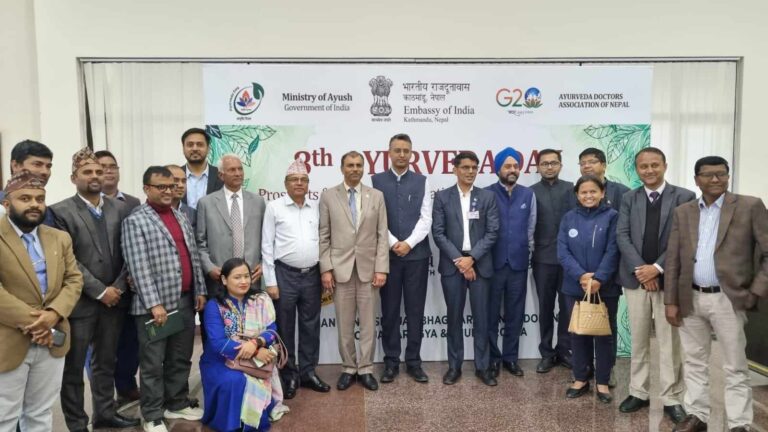In a significant move towards the promotion and development of traditional medicine, particularly Ayurveda, the Indian Embassy in Kathmandu recently organized a discussion in the capital. The event, organized as part of the celebration of the 8th Ayurveda Day, was attended by various stakeholders, including representatives of the Government of Nepal, Association of Ayurvedic Doctors of Nepal, chambers of commerce and Ayush industry in Nepal. This gathering and collaborative efforts mark a critical step in the right direction, and we must recognize the importance of such efforts in today’s world. The Himalayan region, which encompasses both Nepal and India, is blessed with a wealth of traditional medicines and knowledge passed down from generation to generation. As the world recognizes the value of holistic health systems and the need to harness their potential, it is imperative that both countries not only promote the use of traditional medicine but also prioritize its conservation. This discussion program and celebration of Ayurveda Day are essential tools to educate people and create awareness about the importance of Ayurveda.
Deputy Head of Mission Prasanna Shrivastava, in her speech at the event, rightly highlighted the collaborative efforts between India and Nepal in the field of traditional medicine, with special emphasis on Ayurveda. He highlighted initiatives undertaken to foster cooperation, which include knowledge exchange, expertise sharing and capacity building. Notably, over the last decade, 281 Nepali students have benefited from these programs. Such initiatives not only strengthen the health sector but also promote people-to-people connections, echoing the spirit of India’s G20 Presidency theme, ‘Vasudhaiva Kutumbakam’, which focuses on the world as a single family. Similarly, Dr. Vasudev Upadhyay, Director General (Ayurveda and Alternative Medicine), Ministry of Health and Population, Nepal, explained that Ayurveda is a recognized and respected health system in Nepal. He also highlighted various measures taken by the Government of Nepal for the promotion of Ayurveda. This recognition and support from the government demonstrates the commitment to preserving and maintaining traditional knowledge rooted in the culture of both nations.
The Ministry of Ayush, Government of India, has been celebrating Ayurveda Day at Dhanawantari Jayanti (Dhanteras) every year since 2016. The theme of the 8th Ayurveda Day, “Ayurveda for One Health – The Ayurveda for Everyone, Every Day,” encourages the idea of holistic health for all. This theme echoes the contemporary healthcare landscape, where people are increasingly seeking natural, holistic alternatives to conventional medicine. In this regard, the importance of this discussion and collaborative efforts between Nepal and India in the field of traditional medicine cannot be overemphasized. Ayurveda, with its thousand-year-old tradition, offers holistic health solutions, rooted in nature and in tune with the well-being of individuals. As the world grapples with health issues related to modern lifestyle, there is a growing realization that traditional systems of medicine like Ayurveda can provide valuable information and treatments. The collaboration between Nepal and India in the field of Ayurveda is not only a diplomatic achievement but also an important step towards improving healthcare and promoting the rich heritage of traditional medicine in the region . Such collaborations are essential to preserving traditional knowledge, promoting holistic health care, creating economic opportunities, and ensuring public health benefits. Ayurveda, with its holistic approach to health and healing, has the potential to address many of the modern health challenges facing the world today. It is therefore crucial that the two countries continue to strengthen their ties in this area and work together to promote the well-being of their people and the global community as a whole.
